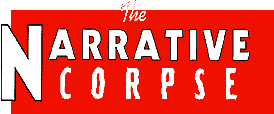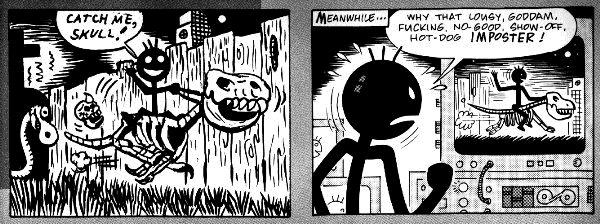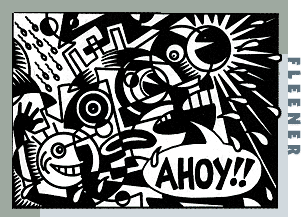The Narrative Corpse
 The credits for this book read like a Who’s Who of alternative and under-ground comix. How about Eisner, Groening, Sacco, Fleener, Ware, Hernandez, Crumb, Lutes, Shelton, and Bagge as just a quickie sample? So when I had a chance to order it from the Quality Paperback Book Club at a discount, I jumped.
The credits for this book read like a Who’s Who of alternative and under-ground comix. How about Eisner, Groening, Sacco, Fleener, Ware, Hernandez, Crumb, Lutes, Shelton, and Bagge as just a quickie sample? So when I had a chance to order it from the Quality Paperback Book Club at a discount, I jumped.
As the inside cover explains, The Narrative Corpse was inspired by an exercise used by the surrealists, designed to toss rational thought out the windows. Here how it works: Start with a generic stick figure as the protagonist. Somebody draws three panels, then passes them on to the next artist, who picks up the story and draws the next three. Sounds like a typical last-minute fill-in issue of Hyperman, right? But when artist #2 is done, all he passes along to the next artist are his three panels, leaving everything that preceded them behind. So no one has any grasp of “the big picture”, or of where the story is coming from. (Hey, no cracks about this sounding like a typical universe-wide crossover, OK?) Repeat until you have material from 69 artists.

I couldn’t do a synopsis of this book if my life depended on it. But that was the idea. The story of Stick Boy goes through more twists and turns in one 12-panel page than a hamburger making its way through your intestine. (If that metaphor offended you, you’d better skip this book; some of the scenes get a bit vulgar.)
I used to play a game like this when I was a kid. One person would start a story, then another would pick it up for a while, and so on. I thought it was fun… except when some kid would ignore a great setup, hastily restructure the situation, and ignore everything that had been built up so far. “And then the vampire killed everyone, turned into a rabbit, and went looking for Elmer Fudd.” It spoiled the story. This happens all too often in work-for-hire comics. And it happened a couple times per page in The Narrative Corpse.
 I understand that the conditions under which The Narrative Corpse was written were intended to create a surrealist narrative. But sometimes it seemed that a given artist just didn’t care what the previous artist had done, and dismissed it summarily, by having the character magically walk into a different scene. By contrast, some artists went out of their way to work with the situations they were handed, even if they didn’t mesh easily with their own style. (Imagine Mort Walker [yes, of Beetle Bailey infame] picking up a scene started by David Mazzucchelli.) That impresses me more than showing off how “imaginative” you can be in three panels.
I understand that the conditions under which The Narrative Corpse was written were intended to create a surrealist narrative. But sometimes it seemed that a given artist just didn’t care what the previous artist had done, and dismissed it summarily, by having the character magically walk into a different scene. By contrast, some artists went out of their way to work with the situations they were handed, even if they didn’t mesh easily with their own style. (Imagine Mort Walker [yes, of Beetle Bailey infame] picking up a scene started by David Mazzucchelli.) That impresses me more than showing off how “imaginative” you can be in three panels.
Is The Narrative Corpse worth $25? It depends what you expect to get for that, I guess. For sheer name-dropping and the chance to see so many great cartoonists “collaborating” on something, it definitely is. For the fascination of seeing something like this happening and analysing how the various artists approached the project and their pieces of it, it might be. (This is where I am.) But if you’re looking for examples of the genius and skills that make many of these artists great (e.g. story, characters), I think you’d be better off buying spending the money on several of their “solo” or more genuinely collaborative creations.
